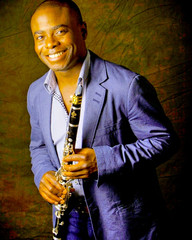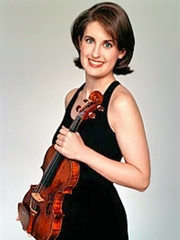|
Back
The Nielsen Bewitchment New York
Avery Fisher Hall, Lincoln Center
01/08/2015 - January 9, 10, 13*, 2015
Maurice Ravel: Valses nobles et sentimentales
Carl Nielsen: Clarinet Concerto
Peter Ilych Tchaikovsky: Swan Lake (Excerpts)
Anthony McGill (Clarinet)
New York Philharmonic, with ten players from Music Academy of the West, Alan Gilbert (Conductor)

A. McGill (© David Finlayson)
The good news about Alan Gilbert’s “Nielsen Project” is its fruition. Not only has the music been performed and recorded, but it has attracted an audience which ordinarily wouldn’t have paid much attention to Nielsen. The bad news about Alan Gilbert’s “Nielsen Project” is that it finished last night, with that enigmatic great Danish composer’s Clarinet Concerto.
Personally, I am overjoyed whenever I hear Carl Nielsen’s music. Many years ago, I descended from a Danish train, wandered a few miles over farmland on the same island from which Hans Christian Andersen was born, and came to Nörre-Lyndelse, a tiny spot where a tinier farmhouse stood, and that–the object of my pilgrimage– was where Nielsen was born.
The lady in charge was charming, especially when hearing that I was living in Bangkok, and I was the first “Thai” to come there. “Do you know,” she said, “we have 58 official museums in Denmark, and Carl Nielsen’s is the smallest of them all?”
Of course Carl Nielsen was just a wee bit more important than that, and Alan Gilbert has proved his worth with music that is still a combination of the broad and the ascetic, with shattering moments (like his obsession with snare drums), with bucolic wanderings that often delve into dark forests and brazenly beaming sunlight, with simple melodies that, like volcanos, contain fire and lava and thunder underneath.
Except that Alan Gilbert would never describe Gilbert with these misplaced metaphors. He has been too busy bring the New York Philharmonic to that edginess of Nielsen’s six symphonies and a few overtures. His symphonies have left some in the audience puzzled, others fascinated. Yet the one commonality is that nobody can forget these performances.
As nobody can forget the performance of the Clarinet Concerto this past weekend by the Phil’s First Chair Anthony McGill. Mr. McGill has a mighty mountain to climb, since his predecessor, Stanley Drucker, recorded the Concerto with Leonard Bernstein, and that recording is a classic.
Messrs Drucker and Bernstein made the Nielsen feel like a monumental challenge, an uphill battle from which one could stand on many musical summits. Mr. McGill, though, played this oh so difficult work with such seeming ease, his fingers not “darting” over the keys, but positively flying from the deepest chalemeau to the highest peaks.
Nielsen never went further than the natural clarinet gamut, nor did he resort to double-voicing and other tricks of the clarinet trade. At the same time, he never gave the clarinetist time to catch his breath (almost literally!!).
Mr. McGill, a diminutive whizzbang performer, never let that stop him for a moment. But while he could amaze us with his technique, it was in the two cadenzas where the composer’s personality–what we would now call a “bi-polar” personality–became so painfully aware.
This was where Mr. McGill allowed his artistic greatness to overcome that virtuoso acumen. The pain, the ebullience, the shrieks which could be laughter or a Scandinavian Edward Munch-style Scream, Mr. McGill penetrated and pulsated to the nth degree.
After a decade with the Metropolitan Opera Orchestra, it’s obvious that their loss is the Phil’s gain. His collaboration with Alan Gilbert was a truly splendid one. And while the combination of “Gilbert and McGill” sounds like a shyster law firm, or a comic vaudeville team, their alliance was a serious and successful one.
The evening began with the more immediately likeable Ravel Waltzes, the orchestration so cosmopolitan, so complete, so...well, pleasant without bite. Ravel has been more exotic in his music, but this was relaxing stuff. (Or would have been relaxing had not a Westminster Choir volume of mass coughing interrupted the final pianissimo measures.)
A confession now, that after the intermission, I wasn’t prepared for how stunningly beautiful the excerpts from Tchaikovsky’s Swan Lake could be. The last time I heard it was in Darren Aronofsky’s audacious horror film with Natalie Portman, The Black Swan, and I didn’t feel like hearing it again.

S. Staples (© New York Philharmonic)
Yet Mr. Gilbert managed to make these so familiar themes sound monumental and balletic and an example of “Tchaikovsky without tears”. As in the Ravel, he swayed with the rhythms (though Mr. Gilbert never overplays the dance movements). Helping him in two sections was concertmaster Sheryl Staples, with some delightful playing, and her duet with cellist Carter Brey was as entrancing a combination as can be imagined.
Harry Rolnick
|